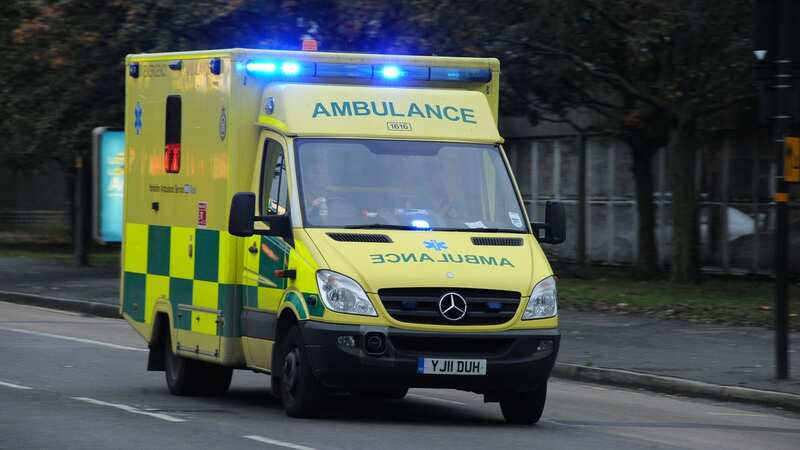NHS A&E waits grow as packed hospitals brace for toughest ever winter

A&E waits are growing as the NHS braces for its toughest ever winter.
Ambulance leaders warned the health service’s seasonal annual crisis had already begun. Looming strikes by junior doctors next month are set to worsen the situation. Some 69.7% of patients in England were seen within four hours in A&Es last month, down from 70.2% in October.
About one in three patients arriving by ambulance at hospitals in England last week waited more than 30 minutes to be handed over to casualty units, figures show. NHS England data reveals 28,498 delays of half an hour or longer were recorded across all hospital trusts in the week to December 10. That was 34% of the 84,268 arrivals by ambulance where the handover time was known - and up from 25% for the week ending November 26.
The College of Paramedics and the Association of Ambulance Chief Executives (AACE) said delays in hospitals were forcing crews to wait outside packed A&E departments units and overcrowded wards, unable to take patients off vehicles. Separate figures compiled by the AACE for October showed patient handover delays at emergency units increased sharply. Delays of 15 minutes or longer reached 237,000 - the second highest volume to date – while delays of an hour or more hit 44,000 - doubling in under six months.
The organisation said: “The time and resources lost to these delays by NHS ambulance services reached 149,000 hours - the equivalent of 119,000 ambulance job cycles. As a result of these handover delays at emergency departments, 37,000 patients were exposed to additional potential harm.”
 Teachers, civil servants and train drivers walk out in biggest strike in decade
Teachers, civil servants and train drivers walk out in biggest strike in decade
AACE managing director Anna Parry said: “These figures are particularly concerning as we head further into winter, underlining the need for a maintained focus on improvements that will reduce and eradicate handover delays, prevent more patients from coming to harm, and mitigate the severe impact on all categories of NHS ambulance performance.”
The College of Paramedics was “very concerned that this winter will be another extremely difficult one for patients and our members”. A spokeswoman added: “Increase in hospital handover delays risks patient harm, leading to an inability to reach patients in the community. Delays in patients moving on from emergency departments causes a delay to patients being handed over from ambulances, which causes delays in 999 responses.” She said “continued support and investment in ambulance services and the paramedic profession” was “desperately required”.
The College called on the Government “to urgently address issues within emergency departments where every day the valuable and precious capacity of paramedics is lost when waiting to handover patients”. The Health Foundation’s assistant policy director Tim Gardner warned that “heading into winter, the NHS is not in a substantially better position than this time last year, which was one of the worst ever”. He added: “How well the health service copes over the coming months largely depends on the weather and seasonal viruses, including influenza. While winter pressures may be inevitable, the annual NHS crisis is not.”
Lib Dem health spokeswoman Daisy Cooper said: "These figures are terrifying. Many will be deeply worried that their loved ones will not get the care they need this winter as the NHS struggles to cope. This Conservative Government is setting our health service up for another crisis this winter. Time and again, they have failed to heed the warnings of NHS staff with devastating consequences. The Government must urgently invest in our NHS to ensure that we do not see the same endless queues of ambulances outside A&Es this time around."
NHS England medical director Professor Sir Stephen Powis admitted: “Every winter is difficult, of course, and last winter was particularly difficult, so we've been planning hard for this winter since last winter, and putting in place additional measures to make the NHS even more resilient.” He added: "We know that infectious diseases are increasing. We are beginning to see Covid increasing again and we're just about I think to come into the winter's usual flu wave.”
Asked how bad ambulance delays will get, Rishi Sunak said: "We know that winter is always a challenging time for the NHS and that's why this year as Prime Minister I made sure that we started planning with the NHS for winter earlier than we've ever done it.”
He said the Government was injecting “£1billion of extra funding” for “expanding A&E departments, putting more ambulances on the road and, crucially, discharge and the social care sector so that people can go back to their homes, back to their local communities once they've finished being in hospital and we can free up that capacity to treat urgent patients”.
He added: “Obviously we'll keep a close eye on it and work closely with the NHS to deliver everyone the care that they need."
The Mirror revealed last month how more than half of England’s A&E departments fail to meet minimum standards. The Care Quality Commission watchdog found 106 out of 197 units were either “inadequate” or “requiring improvement”.
Read more similar news:
Comments:
comments powered by Disqus

































